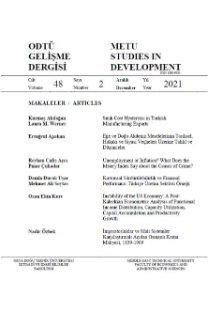The Economic Crisis of 2008: Reproduction of the Core-Periphery Relations between the European Core and the Balkans
1990'lara damgasını vuran, merkezi planlama ekonomilerini serbest piyasa ekonomisine ve tek parti yönetimini çok partili demokrasiye dönüştürmeyi amaçlayan geçiş süreciydi. Sonucu daha ziyade Balkanlar'ın çevre ülkelerine ait özelliklerinin yeniden üretimi oldu. Sürecin sıkıntıları sanki bu ülkelerden kaynaklanıyormuş ve onların hatasıymış gibi sunuldu. Merkezin krize gireceğini pek az kişi öngörebilmişti. Merkez'de başlayan 2008 krizi doğrudan Balkanlar gibi çevreyi etkiledi ve işsizlik ile bütçe açıkları arttı. Savaş yıkımları ile geçen bir onyılın ardından, bir onyıl da neo-liberalizm altında yıkım ile geçtikten sonra, Balkanlar gene çevreleşme süreci yaşamaktadır. Bu çalışma bu çevreleşmenin yeniden üretiminin nasıl gerçekleştiğini incelemeyi amaçlamaktadır.
2008 Ekonomik krizi: Merkez-çevre ilişkilerinin Avrupa merkezi ve Balkanlar arasında yeniden üretimi
The 1990s were marked with the transition process that aimed to transform the central command economies to liberal free market economies and the single party regimes to multiparty democracies. The result has been mostly the reproduction of the peripheral characteristics of the Balkans. The shortcomings of the process have been asserted as if the deficiencies were local and hence the Balkan countries were to blame for it. Few could predict that the core would be in crisis. The 2008 crisis in the core directly affected the periphery - the Balkans - where GDP decreased and unemployment and budget deficits rose up. Following a decade of destruction through violence and a decade of destruction in the name of neo- liberalism, the Balkan region has once again been experiencing peripheralisation. This study attempts to examine the way in which such a reproduction of the peripheralisation occurred.
___
- CAUSEVIC, F. (2012), What Type of Fiscal Policy for the Western Balkans during the Crisis?, Southeast European and Black Sea Studies, 12(2), 357-72.
- COX , R.W. (1987), Production, Power and World Order, Social Forces in the Making of History, New York: Columbia University Press.
- COX , R.W.(1989), Production, the State and Change in World Order, in J. Rosenau, E. O. Czempiel (eds.), Global Changes and Theoretical Challenges, Massachusetts/Toronto: Lexington Books.
- CRAMPTON, R.J. (2002), The Balkans since the Second World War, London: Pearson.
- CRAMPTON R.J. and ALLCOCK, J. B. (2014), The Balkans, Encyclopaedia Britannica, _____http://www.britannica.com/EBchecked/topic/50325/Balkans>.
- FOUSKAS, V.K. (2011), Dealing with Sovereign Debt Crises Today: Lessons from Eastern Europe and the Balkans, Debatte: Journal of Contemporary Central and Eastern Europe, 19(3), 633-48.
- GANIC, M. (2012), The Impact of the Global Financial Crisis on the Banking Sector of Western Balkans: Cross-country Comparison Analysis, Journal of Economic and Social Studies, 2(2), 177-96.
- HULIARAS, A. (2011), Foreign Aid to the Balkans (19902010): The Dynamics of the Silent Human Security Agenda, Southeast European and Black Sea Studies, 11(4), 421-34.
- JELAVICH, B. (1983), History of the Balkans, 2, Cambridge: Cambridge University Press.
- JEFFRIES, I. (2002), The Former Yugoslavia at the turn of the Twenty-first Century, A Guide to Economies in Transition, London: Routledge.
- LAMPE, J. R. and JACKSON M. R. (1982), Balkan Economic History, 1550-1950, Bloomington: Indiana University Press.
- MAZOWER, M. (2000), The Balkans, London, Weidenfeld and Nicolson.
- NIKOLIC, R., FEDAJEV, A., RIZNIC, D., DAMNJANOVIC, Z. and KOSTADINOVIC, A., (2013), Economic Crisis In The Western Balkans, Metalurgia International, vol. XVIII Special Issue no. 8.
- PALAIRET, M. (2000), Balkan Ekonomileri 1800-1914, İstanbul: Sabancı Üniversitesi Yayınları.
- PANAGIOTOU, R.A. (2010), Effects of the Global Economic Crisis on South-east Europe, Journal of Balkan and Near Eastern Studies, 12(2), 187-94.
- RISTESKI, S. and TRPKOVA, M. (2011), Global Economic Crisis and Its Impact On The Western Balkan Countries Labor Markets, Revista Tinerilor Economişti (The Young Economists Journal), 96-107.
- STAVRIANOS, L.S. (1958, 1999), The Balkans since 1453, London: Hurst and Company.
- TÜRKEŞ, M. (2004), Double Processes: Transition and Its Impact on the Balkans in I. Hadjsky (ed.), Towards Non-violence and Dialogue Culture in Southeast Europe, Sofia: The Institute for Social Values and Structures Publications, 13-28.
- WALLERSTEIN, I. (2000), World Sytem School, in A. Linklater (ed.), International Relations: Critical Concepts in Political Science, London: Routledge, 2000.
- WELFENS, P.J. (2001), Stabilising and Integrating the Balkans, Economic Analysis of the Stability Pact, EU Reforms and International Organizations, Berlin-Heidelberg: Springer-Verlag, 2001.
- WALLERSTEIN, I. (1976), A World System Perspective in Social Sciences, The British Journal of Sociology, Special Issue History and Sociology, 343-52.
- ISSN: 1010-9935
- Yayın Aralığı: 3
- Başlangıç: 2018
- Yayıncı: ODTÜ İİBF
